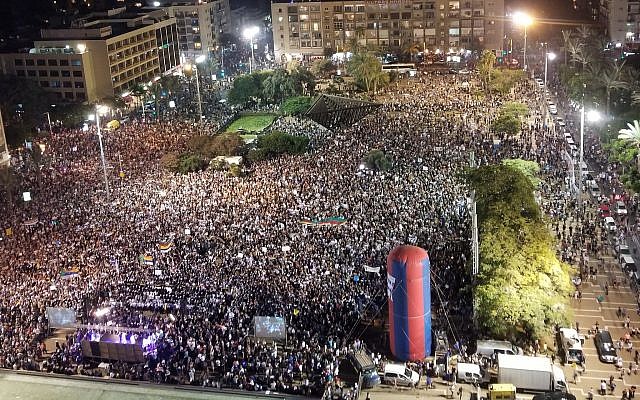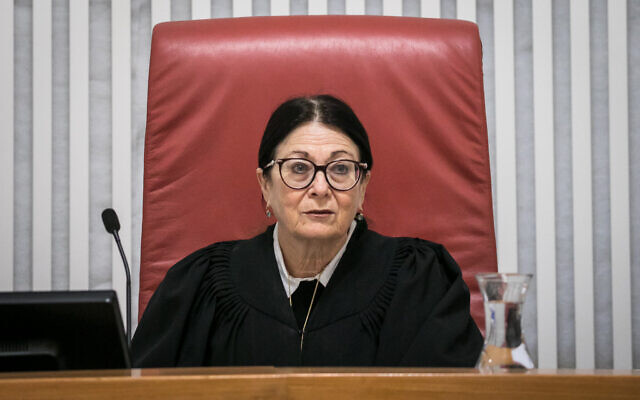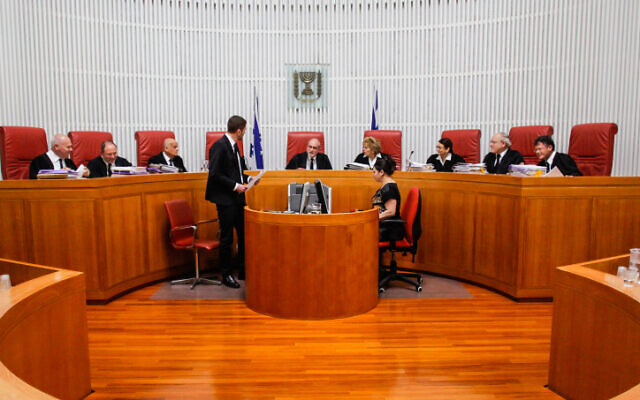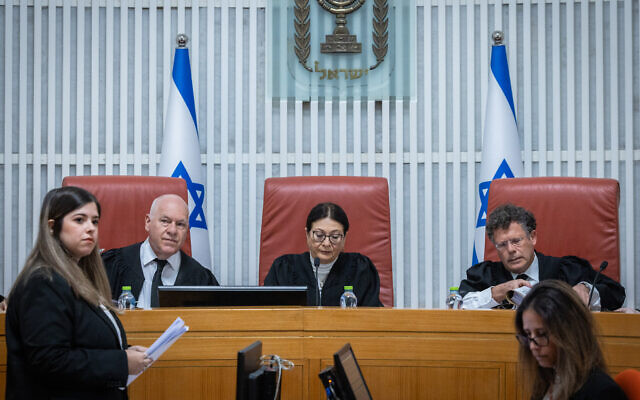T. Belman. I highly recommend this analysis.
The government aims to hobble the High Court’s ability to review legislation. If judges try to strike down the law that institutes the change, there may be a high-stakes showdown
By JEREMY SHARON, TOI 17 January 2023,

The proposals to drastically alter Israel’s legal and judicial landscape unveiled by Justice Minister Yariv Levin on January 5 have swiftly fomented deep societal discord, with government and opposition politicians trading incendiary accusations and the swift establishment of a fervid protest movement.
Proponents say the sweeping changes are a corrective to an overly activist judiciary undermining the will of the people, whereas critics, including numerous jurists and legal scholars, counter that the drastic reform package would hollow out Israel’s democracy, leaving the country with no effective check on legislative power.
While the streets appear near the boiling point over this polarizing issue, a more fundamental threat may await the country as this clash plays out. The government’s effort to severely restrict judicial review over Knesset legislation and executive action could lead to a constitutional crisis: a situation in which the government and the High Court of Justice come into direct conflict.
Israel’s Judiciary: Reform or Ruin?
Such a clash is far from certain, but experts say the ingredients are there.
And the consequences of such a confrontation could have long-term implications for the State of Israel, depending on the response of these branches of government to each others’ actions.
Were the court to intervene over the legislation to enact the legal changes and the government then decided to ignore any such decision, confidence in the rule of law in Israel, both domestically and internationally, would be significantly undermined, while the court itself could be fatally weakened.
At the same time, intervention by the court and other state institutions to thwart the measures may further escalate discord, with unpredictable consequences for societal stability.
High Court end run
In his early January announcement, Levin introduced what he said was the first stage in the overhaul of the legal and judicial system — a program of highly controversial changes that if enacted would have far-reaching consequences for Israel’s system of government.
Justice Minister Yariv Levin holds a press conference unveiling his plans to overhaul the judicial system at the Knesset on January 4, 2023. (Olivier Fitoussi/Flash90)
The plans include severely restricting the High Court’s capacity to strike down laws and government decisions; passing an “override clause” enabling the Knesset to re-legislate such laws; giving the government control over the selection of judges; preventing the court from using a test of “reasonableness” against which to judge legislation and government decisions; and allowing ministers to appoint their own legal advisers instead of getting counsel from advisers operating under the Justice Ministry aegis.
One of the reforms that worries jurists and the liberal democratic political bloc the most is the proposal to restrict the High Court’s ability to strike down legislation for violating Basic Laws, and to enable the Knesset to reverse any such decision if the court did manage to strike down a law.
The law proposed by Levin would require a panel of all the court’s 15 justices and a “special majority” of 12 of them to strike down Knesset legislation, should a petitioner challenge a law in the High Court.
Right-wing politicians argue such legislation is needed due to what they claim is the partisan nature of the bench. Rather than a judicious check on untrammeled government power, many on the right view the High Court as a politicized organ with the ability to shackle democratically elected politicians, despite not having itself been elected.
The court and its backers, meanwhile, view the bench as having a key role in determining whether new legislation falls in line with the closest thing Israel has to a constitution: a set of 13 Basic Laws that address fundamental aspects of the state and its governance.

Israelis protest against sweeping proposals to overhaul Israel’s legal and judicial system in Tel Aviv, on January 14, 2023. (AP Photo/Oded Balilty)
The court’s authority to strike down legislation has never been explicitly stated in any law.
But Basic Law: Human Dignity and Liberty passed by the Knesset in 1992 does lay out a series of fundamental rights, including the preservation of life, personal liberty, privacy and property rights.
The law also references the Declaration of Independence as a source of constitutional values for the country, and asserts that those values include the State of Israel being “a Jewish and democratic state.”
The Basic Law adds that the rights stipulated within it cannot be violated.
In a landmark 1995 ruling in the Mizrahi Bank v. Migdal Cooperative Village case, then-Supreme Court chief justice Aharon Barak, backed by seven other justices, argued that the Basic Laws were passed by the Knesset in its capacity as a constituent assembly, and that they could therefore be considered superior to regular laws — thus anointing them with a quasi-constitutional status.
This decision set a precedent for the court to employ judicial review over Knesset legislation. Since then, 22 laws and numerous government decisions have been struck down or reversed, usually for violating Basic Law: Human Dignity and Liberty. The rulings have fueled particular frustration on the right, making an override measure a prime policy goal for leading figures in Likud including Levin, the Religious Zionism party and the ultra-Orthodox parties.
The new government appears set to pursue these reforms by passing a new Basic Law: Legislation.
Critically, further legislative measures will explicitly stipulate that the High Court of Justice does not have judicial review over Knesset Basic Laws, thus shielding the override clause itself from judicial review.

It is this stipulation in particular that could provoke a direct clash between the government’s attempts to defang the court through legislation, and the court’s possible unwillingness to accept such legislation as valid.
The legislation enacting these reforms will, once passed, almost inevitably be the subject of petitions to the High Court by various organizations claiming them to be unconstitutional and in violation of Israel’s basic values as both a Jewish and democratic state.
Assuming the court agrees to hear these challenges, as it has done for petitions against other new Basic Laws and amendments to existing ones, Israel will likely find itself on the path to a potentially severe constitutional crisis.
Should the High Court attempt to strike down laws that the Knesset claims the judiciary has no authority to interfere in, democracy could suddenly get very messy.
Basic Laws, complex questions
The High Court has never struck down a Basic Law, but it has developed two doctrines that open such a possibility, according to Yaniv Roznai, an associate professor at Reichman University and an expert in constitutional law.
Associate professor at Reichman University and constitutional law expert Yaniv Roznai. (Gilad Kavalerchik)
The first pertains to what is known as the misuse of constituent power, which can be used in cases where the Knesset enacts a new Basic Law or amends an existing one for a specific, limited purpose, such as revoking a deadline or assisting a particular individual.
Such bills, usually designed to get around a short-term political hurdle, should not be enacted at the constitutional level according to the misuse of constituent power doctrine.
In May 2021, the High Court ruled that an amendment to Basic Law: Knesset — passed the previous year in order to give the troubled Likud-Blue and White coalition more time to sort out its political differences before the Knesset was automatically dissolved — had been an improper use of parliamentary power.
Although the court technically declined to strike down the amendment, it strongly intimated that a similar future amendment might be deemed unconstitutional, indicating the High Court was willing to weigh in on Basic Laws under certain circumstances.
A similar case that is currently pending before the court involves three petitions against new Interior and Health Minister Aryeh Deri. One of the central claims of those petitions is that legislation passed by the new government amending Basic Law: The Government to allow Deri to be appointed as a cabinet minister despite his recent suspended jail sentence is a misuse of constituent power.
A ruling by the court that this amendment was indeed a misuse of constituent authority would further strain the already extremely tense relations between it and the government, given that the justice minister has stated specifically that this administration seeks to ban the court from exercising judicial review over Basic Laws.
Supreme Court President Esther Hayut and other justices at a hearing of the High Court of Justice on petitions against the appointment of Shas party leader Aryeh Deri as a minister due to his recent conviction for tax offenses, January 5, 2023. (Yonatan Sindel/Flash90)
It is thought unlikely that the court will intervene over this Basic Law amendment due to the highly fraught situation such a decision would create.
But the same case involves another realm of possible conflict between the judiciary and the government, since the petitioners also argue that Deri’s appointment should be voided on the grounds that it is “unreasonable” in the extreme.
“Reasonableness” is a somewhat amorphous but commonly used standard of judicial review used by courts to determine whether administrative decisions are “reasonable” and have been made with the proper consideration of all relevant factors.
Levin and others in the right-wing religious bloc argue, however, that reasonableness gives the court undue power to intervene in government decisions and policy initiatives and therefore seek to annul it.
The petitioners against Deri argue that his 1999 conviction for bribery and his 2022 conviction and suspended jail sentence on two tax fraud charges make his ministerial appointment unreasonable.
One of the components of Levin’s reforms is to limit or entirely prohibit the court’s use of reasonableness as a method of judicial review. Should the court rule that Deri’s appointment is unreasonable, that would create another avenue for a clash between these branches of government, and see the new government expedite legislative efforts to work around the court’s decision.
The unconstitutional constitutional amendment
The second doctrine for intervening over Basic Laws that has been entertained by the court is that of an unconstitutional constitutional amendment.
In Israel’s case, a unconstitutional constitutional amendment would be a new Basic Law or an amendment to an existing Basic Law that the court might deem to be in violation of other Basic Laws or, more fundamentally, to violate the very essence of the state as laid out in other documents, perhaps including the Declaration of Independence.
The possibility of a showdown between the High Court and the government over an unconstitutional constitutional amendment emerged following the Knesset’s 2018 adoption of Basic Law: Israel – The Nation State of the Jewish People.
This controversial law states, among other things, that only the Jewish people have a national right to self-determination in the State of Israel and that “Jewish settlement” is a “national value” that the state should encourage and promote. It generated outrage and strong opposition within Israel, with claims that it undermined Israel’s democratic nature and threatened the equality of the country’s non-Jewish citizens.

Tens of thousands participate in a Druze-led protest in Tel Aviv against the Jewish nation-state law, on August 4, 2018. (Adam Rasgon/Times of Israel)
In response to a flurry of petitions, the High Court ruled 10-1 in July that the law could be interpreted in non-discriminatory ways, and thus it need not be struck down.
In her opinion, court president Esther Hayut wrote that since Israel has merely an unfinished constitutional framework, courts could not normally make use of the “unconstitutional constitutional amendment” doctrine to strike down a Basic Law.
But her ruling also carved out an instance in which the Knesset’s power to legislate Basic Laws could be restricted.
“In my approach, at this stage of Israel’s constitutional endeavor, there is one restriction, exceedingly narrow, which is incumbent on the Knesset in its function as the constituent authority and that it is unable to revoke through a Basic Law [which is] Israel’s essence as a Jewish and democratic state,” wrote Hayut.

Supreme Court Chief Justice Esther Hayut at a court hearing on the Shin Bet’s new emergency powers to track Israelis’ movements using their cellphone location data to help combat the spread of the new coronavirus, March 19, 2019. (Olivier Fitoussi/Flash90)
While she declined to state explicitly whether the High Court would be entitled to apply judicial review and invalidate a Basic Law that infringed on that “essence” of Israel’s character as a Jewish and democratic state, Hayut nonetheless left it open as a possibility.
Because the Nation State law did not violate Israel’s character as both a Jewish and democratic state, such a determination could be postponed until “the right time,” she wrote.
Levin and the other proponents of the government’s judicial reforms have already predicted such an eventuality, which is why part of the reform package includes explicitly prohibiting the court from striking down any Basic Laws.
But even under such circumstances, the court might reject the premise of such a law, and rule that a Basic Law banning judicial review of Basic Laws is unconstitutional, triggering a constitutional crisis.
Any invalidation of a Basic Law meant to restrict the High Court’s power to review legislation would constitute a major constitutional crisis and an unprecedented showdown between the branches of government.
Court not looking for a fight
Roznai believes that the High Court is unlikely to outright strike down a Basic Law that allows for an override clause, noting that it would be difficult to convince the court that the override law in and of itself negates the core of Israel’s democratic character.
Whether or not the court intervenes also depends on the exact design and scope of the override law, Roznai said.

A nine-judge panel of the High Court of Justice headed by then Supreme Court President Asher Grunis during a hearing of a petition by human rights groups against an amendment to the Prevention of Infiltration Law, April 1, 2014. (Flash90)
The court is more likely to punt the case away by implementing the so-called ripeness doctrine, ruling that it is too early to tell if the override clause will do damage to Israel’s democracy.
Amir Fuchs, a senior researcher at the Israel Democracy Institute, said the court would likely go far to avoid a showdown with the government and Knesset, as the implications of such a ruling in direct defiance of the legislature and executive would create a full-blown constitutional crisis.
“If the government uses the override clause in only very specific situations where rights are infringed but not abolished, the court may decide not to involve itself,” said Fuchs.

Amir Fuchs, senior researcher at the Israel Democracy Institute’s Center for Democratic Values and Institutions (Courtesy Israel Democracy Institute)
But, should the Knesset begin to pass laws that not only infringe basic rights but grossly violate them, or revoke them altogether, the court might then decide that it is entitled to review such laws even if they include a clause marking them immune from judicial interference.
“At this point, the court might say such laws are not what the override clause is meant for, and that the legislation is designed only for a specific problem, not to abolish rights entirely,” said Fuchs.
Even just agreeing to hear a petition against a law carrying an immunity clause would create severe tension between the bench and the governing majority and by itself constitute a form of constitutional crisis. Israelis got a preview of this when Levin in 2020, during his tenure as Knesset speaker, threatened to defy the court if it quashed the Nation-State legislation.

Members of the Im Tirzu movement protest outside a court hearing on petitions against the Jewish Nation-State Law, at the Supreme Court in Jerusalem on December 22, 2020. (Yonatan Sindel/Flash90)
Indeed, the draft legislation for the amendment to the Basic Law: Judiciary published by Levin last week states explicitly that the court is forbidden from even holding hearings on petitions against Basic Laws.
Should the court actually issue a ruling rejecting the Knesset’s assertion of unlimited legislative powers, it would put Israel into a full-blown constitutional crisis pitting the judicial and legislative branches against each other.
A constitutional standoff
How such a situation would play out over the legal and judicial overhaul proposed by the new government is impossible to predict, but Roznai pointed to two such crises in modern times as possibly instructive.
In a landmark ruling in 1980, the Indian Supreme Court delivered the Minerva Mills judgment, holding that a section of the 42nd Amendment to the Indian constitution passed by the Indian parliament in 1976 removed all limitations on the parliament’s amendment power and was therefore beyond parliament’s limited amendment power, and thus void.
The Indian government bowed to the court’s decision and the ruling now forms a crucial component of the supremacy of India’s constitution over the legislature.
By contrast, when the Hungarian parliament pushed through legislation in 2013 preventing the country’s constitutional court from striking down constitutional laws, the court refrained from striking down this legislation and submitted to the will of the government.
The move to concentrate power in the legislature is one factor that has seen Hungary’s democracy downgraded in democracy rankings such as the Economist Intelligence Unit’s Democracy Index, which now rates the country as a “flawed democracy.”
In Israel, Fuchs, said the outcome of a showdown between judges and lawmakers would come down to how it played out on the ground and in the reality of daily life.s)
If, by way of an extreme example, the Knesset passed legislation making it a criminal offense for the media to criticize the government, the court struck the law down, and the Knesset re-legislated the law using the override mechanism, the outcome of this standoff would be determined by what happens to media outlets that violate that law.
Would the police arrest the violators and would the state attorney’s office prosecute the offenders? If those agencies declined to take action on the basis of the new law, would the government begin to replace the senior officials in order to assert its will?
Fuchs opined, however, that such an apocalyptic scenario was somewhat “beyond the realm of imagination,” arguing that the High Court is relatively conservative and unlikely to embroil itself in such a situation.
And Roznai noted that huge constitutional conflagrations such as those described above rarely occur in modern democracies.
Democratic erosion, he said, usually occurs gradually over the course of years, pointing to the creeping decline of judicial independence and power in illiberal democracies such as Hungary and Poland.
“Usually it is not one constitutional amendment that strikes the fatal blow to democracy,” he said. “In most cases, it is a process whereby different laws erode democracy bit by bit.”






Didn’t the government outlaw Arutz Sheva at one point? Didn’t Lapid nearly get a publication shut down for being too symathetic to Bibi without the court saying anything? I seem to recall Bibi resigning to keep it from a vote.
There is no neutral arbiter, least of all the Supreme Court. Felix is right. Let them grow vegetables on a kibbutz. That’s the most democratic thing they could do. At last they would be doing an honest productive day’s labor.